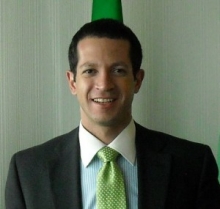Michael C. Horowitz Awarded Department of Defense Grant to Lead Team on Study of Autonomous Systems and AI

Michael C. Horowitz, Professor of Political Science, will lead a research team that has been awarded a $1.04 million grant from the Air Force Office of Scientific Research, through the Department of Defense (DoD) Minerva Initiative, for a project titled “The Disruptive Effects of Autonomy: Ethics, Trust, and Organizational Decision-Making.”
Horowitz, who is the primary investigator, will oversee the study of the effects of autonomous systems and artificial intelligence. The Minerva program is specifically designed to facilitate social science research relevant for national security. The Penn team will collaborate with researchers from the University of Denver, the Naval War College, and Yale University.
“Potentially rapid advances in autonomous systems raise fascinating questions about how technology affects human behavior inside and outside the military domain,” says Horowitz, who has provided expert commentary on military technology to Congress and is the author of the award-winning book, The Diffusion of Military Power: Causes and Consequences for International Politics. “Answering these questions requires going beyond technological simulations and instead examining how behavioral factors-like trust, emotions, and organizational incentives might shape the use and effectiveness of autonomous systems.”
The project seeks to understand the human, organizational, and political factors that could affect the willingness of individuals and bureaucracies to adopt autonomous systems, and the potential consequences of these attitudes. For instance: What are the implications of a trust gap between military personnel and autonomous systems? And how would these systems affect the willingness of the U.S. public and decision-makers to support the use of force?
In addition, the team will work to advance knowledge about the potential consequences of autonomous systems for DoD policy and the modern battlefield, as well as shed light on how other actors—both state and non-state—will incorporate autonomous systems.
“I am excited about the opportunity to apply social science research to this technological space,” says Horowitz. “It will help to build a broader understanding of the potentially disruptive behavioral and organizational effects of autonomy.”





